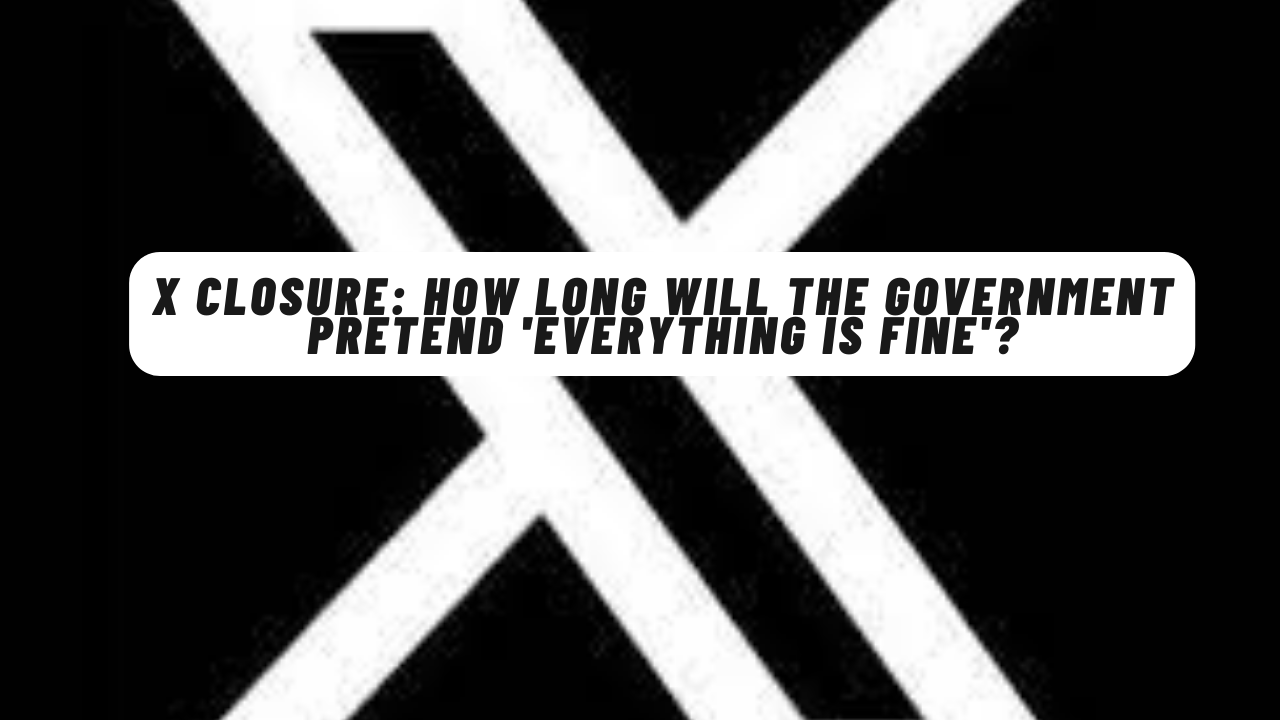X closure: How long will the government pretend ‘everything is fine’?
After court inquiries against the unannounced shutdown of social media platform X (formerly Twitter), the government has adopted a new tactic and that is to pretend as if nothing happened.
They think we are fools. The closure of X is not only unconstitutional and illegal, but the matter is also mysterious,” said Abdul Moez Jafri, who is among the petitioners who filed a petition in the Sindh High Court against the closure. The hearing of this application was to be held on Wednesday.
Abdul Moez Jafari told the previous hearing how a representative of Pakistan Telecommunication Authority (PTA) showed the X application in court on his mobile and pretended that there was no outage. Thus he misled the court.
This appears to be their latest tactic for demonstrating that everything is well.,” he says. They try to assure the court that freedom of expression has not been harmed in any way and are terming it as a whisper.
But when Chief Justice Sindh High Court Aqeel Ahmed Abbasi asked the petitioner whether the PTA’s claim was true, the petitioner told the court that the authorities had undoubtedly used a usage of a virtual private network (VPN) to gain website access. are using which a large number of people do not have access to.
‘Misleading the public’
According to Abdul Moez Jafari, “Majority of the people of Pakistan see this as a move by the government to mislead and keep them in the dark.” And a large number of people have now had enough.
More than a month has passed since the closure of X in different areas of Pakistan. The unofficial ban on X began when former Rawalpindi Commissioner Liaquat Ali Chatta accused the Chief Election Commissioner and Chief Justice of being involved in rigging the February 8 general elections.
The newly elected government has absolved itself of the closure of X. New Information Minister Atta Tarar admitted that X is closed but no official notification has been issued regarding its closure.
When Dawn approached the PTA for a statement on the matter, the PTA asked the Ministry of Home Affairs to ask questions about X. When pressed, he attributed the instructions to the government.
But digital rights activists are not satisfied with this. Fariha Aziz stressed that only the PTA has the legal authority to block websites as per Section 37 of the Prevention of Electronic Crimes Act (PECA). Any proposal to the contrary is not legally valid.
Abdul Moez Jafari explains that ‘obviously there are some limits in the law to ban any online content. The ban is for content that affects the integrity of the state, is not acceptable from Islamic point of view or any content that leads to disorder and unrest.
Apart from that, he says, there is no “legal situation in which a regulator would ban a website”.Existing laws such as Section 37 of PICA also have a mechanism for censorship. Lawyer and digital rights activist Usama Khilji says, “PTA should send a notice to the website, there should be an appeal option, there should be an explanation and there should be a public notice of the closure, but none of this has been implemented.” is going’.
There is no notification from the PTA or any formal statement from the government in the case of X.
Obviously, people using social media for professional purposes are more affected by this outage.
How are creators and journalists affected?
The 2023 report of the Overseas Investors Chamber of Commerce and Industry estimates that digital transformation can add a staggering $60 billion to Pakistan’s economy in the next seven to eight years.
“Social media applications are essential to many people’s businesses and jobs, especially content creators who depend heavily on social media to create and publish their content,” says content creator Saba Bano Malik.
She points out that when social media platforms are repeatedly banned, it disrupts the continuity of both users and content creators. “Closing breaks the flow of posting and engagement, making it difficult for creators to keep their users engaged,” she says.
Saba adds, “Content creators’ relationships with brands are also affected by not completing work on deadlines and not delivering results due to the shutdown.”
Another section that is affected by all this is the journalists. According to Anbar Rahim Shamsi, head of IBA’s Center for Excellence in Journalism and one of the petitioners in the Sindh High Court petition, the ban is actually interfering with the work of fact checkers.
She says that when you’re doing fact-checking, one of the criteria is to check how viral the content is. X is used by a large number of people (WhatsApp is the most popular application but it is more for personal use than X) and it is estimated that misinformation or news does not go viral on social media. .
She says it can’t be done via VPN because it doesn’t work properly. Also after tracking misinformation online, the spread of information is compared across multiple platforms such as Facebook, Instagram and X.
Unannounced shutdowns therefore make it extremely difficult to gauge the spread of misinformation. This is mainly a problem for fact-checkers and thus misinformation spreads in the absence of an independent system of checks and balances.

